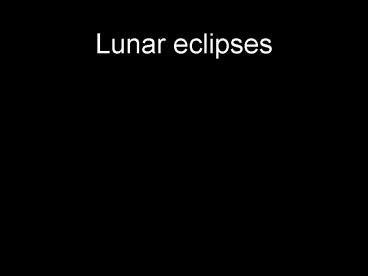Lunar eclipses PowerPoint PPT Presentation
Title: Lunar eclipses
1
Lunar eclipses
2
The Moon enters the Earths shadow. The region
of total shadow is called the umbra. The penumbra
around this can be reached by some light from the
Sun.
3
Eclipses always occur at Full Moon as the
Moon must be on the far side of the Earth and so
we can view all the lit side.
4
You dont get an eclipse every Full Moon. The
Moons orbit is angled at about 5o to the
ecliptic and the Moon usually goes above or below
the Earths shadow.
5
Approximately once every 6 months, the Sun,
Earth and Moon line up in the same plane.
21st Jan 2000 16th July 2000 9th Jan
2001
The yellow-red colour is due to light
refracting from the Earths atmosphere.
6
The type of lunar eclipse depends on how the
Moon passes through the Earths shadow.
7
Penumbral eclipse are rather dull. The Full Moon
gets a little dimmer as it passes through the
penumbra and some sunlight is prevented from
reaching it.
8
Penumbral eclipse 20th Nov 2002
9
Partial eclipses are more interesting. The
part of the Moon that passes through the shadow
of the Earth disappears. Total eclipses
are more fun.
10
January 21st 2000 at 0220
11
January 21st 2000 at 0305
12
January 21st 2000 at 0320
13
January 21st 2000 at 0335
14
January 21st 2000 at 0350
15
January 21st 2000 at 0404
16
January 21st 2000 at 0437
17
January 21st 2000 at 0507
18
January 21st 2000 at 0535
19
January 21st 2000 at 0550
20
January 21st 2000 at 0605
21
January 21st 2000 at 0620
22
January 21st 2000 at 0650
23
January 21st 2000 sequence and animation
24
Dec 9th 1992 sequence
25
July 16th 2000 sequence
PowerShow.com is a leading presentation sharing website. It has millions of presentations already uploaded and available with 1,000s more being uploaded by its users every day. Whatever your area of interest, here you’ll be able to find and view presentations you’ll love and possibly download. And, best of all, it is completely free and easy to use.
You might even have a presentation you’d like to share with others. If so, just upload it to PowerShow.com. We’ll convert it to an HTML5 slideshow that includes all the media types you’ve already added: audio, video, music, pictures, animations and transition effects. Then you can share it with your target audience as well as PowerShow.com’s millions of monthly visitors. And, again, it’s all free.
About the Developers
PowerShow.com is brought to you by CrystalGraphics, the award-winning developer and market-leading publisher of rich-media enhancement products for presentations. Our product offerings include millions of PowerPoint templates, diagrams, animated 3D characters and more.

